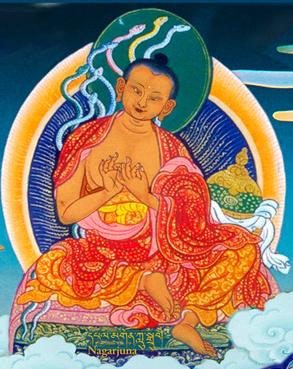Arya Nargarjuna
Mulamadhyamaka-karikas
Fundamentals of the Central Philosophy of Buddhism
 Section 6: An Analysis of Desire and One Who Desires in the Context of Their Separateness and Concomitance (affection and the person affected)
Section 6: An Analysis of Desire and One Who Desires in the Context of Their Separateness and Concomitance (affection and the person affected)
VI.1.
If the “one who desires” would exist before desire itself, then desire may be regarded.
When desire becomes related to “one who desires,” then desire comes into existence.
VI.2.
If there is no one who desires, how then will desire come into being?
And the question whether desire exists or does not exist likewise holds true for the one who desires.
VI.3.
Further, it is not possible for both desire and the one who desires to be produced concomitantly.
Indeed, desire and the one who desires come into being independent of each other.
VI.4.
Concomitance does not exist in that which is only one thing, for certainly something which is only one thing cannot be concomitant.
But yet, how will concomitance come into being if there are separate (prthak) things?
VI.5.
If concomitance applied to that which is only one thing, then that one “with concomitance” would be that one “without concomitance.”
If concomitance applied to separate things, then that one “with concomitance” would be that one “without concomitance.”
VI.6.
And if concomitance applied to separate things, what is the proof for the separation of both desire and the one who desires,
Since that which is non-separate is concomitant.
VI.7.
Or, if the separateness of desire and the one who desires really were proved,
Why do you imagine the concomitance of them both?
VI.8.
You postulate concomitance by saying: neither is proved separate from the other.
And you postulate separateness even more to prove concomitance.
VI.9.
Because separateness is not proved, concomitance is not proved.
What kind of separateness must exist for you to establish concomitance?
VI.10.
Thus there is no proof that the desire is concomitant with or not concomitant with one who desires.
From this analysis of desire it can be shown that for every fundamental element (dharma) there is no proof of concomitance or non-concomitance.
Source: Orientalia





